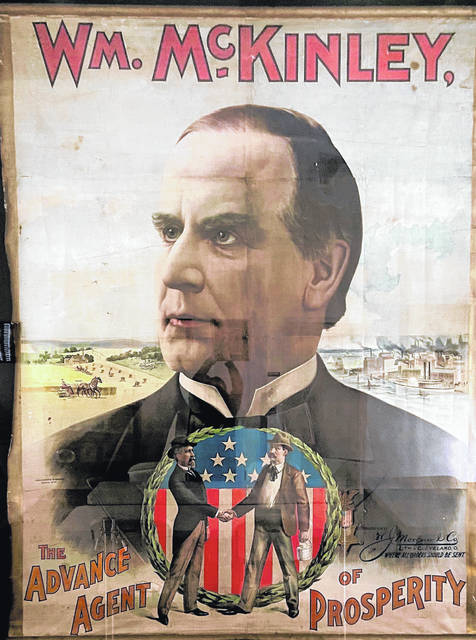
One hundred and twenty-seven years ago Sunday, then-Ohio governor William McKinley made a campaign stop in the Ross County village of South Salem, where many Greenfield students will attend school today.
The future United States President was seeking re-election to the governorship, with the Sept. 6, 1893 appearance drawing crowds from Hillsboro, Chillicothe, Greenfield and other neighboring towns and villages for miles around.
The Chillicothe Daily Gazette wrote that more than 1,200 people from that city alone took a 45-minute trip by train to attend the event, with an equal number coming from Hillsboro to hear the popular governor give his speech at Parrett’s Grove, described by it’s counterpart, The Hillsboro News-Herald, as “a beautiful little grove owned by Strawder Parrett.”
The newspapers reported that folks came on foot, horseback, in buggies or by train, with those living in South Salem coming to stay the day and bringing their dinners with them.
“He was running for his second term,” South Salem historian Lew Speakman told The Times-Gazette. “Since he had been here two years prior to that in September 1891 and had a good turnout of between 3,000 and 4,000 people, he was eager to come back for a second visit.”
Speakman said the governor’s term of office was only two years at that time, but McKinley enjoyed popularity among those in the Buckeye State, and South Salem, with a population of around 400 at that time, handily accommodated his supporters.
The Chillicothe newspaper detailed the preparations for McKinley’s appearance, writing that “a vast amphitheatre of seats had been arranged in front of the speakers’ stand, capable of accommodating three thousand people, and the rest crowded close about the stand.”
At 2 p.m., with the crowd of nearly 8,000 cheering, Gov. McKinley took his place on the platform along with two Cincinnati lawyers who were close friends, confidants and campaign supporters, Robert Morgan and Thomas McDougall.
“McDougall was the reason McKinley came to South Salem,” Speakman said, adding that he was an immigrant from Scotland who came to Cincinnati and eventually became a prominent lawyer. “He came to South Salem to visit his wife’s brother and their family, and while he was here, he was impressed with the intelligence and culture of the local people.”
He said the reason for the intellectual standing of those in the village, described by The Hillsboro News-Herald as “a farming community nestled in the fertile Buckskin valley,” was the South Salem Academy, a two-year college whose alumni included Senator McDill of Iowa and former Ohio Governor Foraker, a longtime Hillsboro resident.
“The area impressed him so much that while he was searching for a place to build a summer home, he decided to settle here,” Speakman said.
The South Salem campaign stop was the brainchild of McDougall, who as a successful lawyer became close friends with McKinley, and while having no political aspirations of his own, Speakman said McDougall would support politicians who shared his views.
“He would campaign for politicians he liked,” Speakman said. “He made several speeches in Chillicothe, Washington Court House and probably Hillsboro, and people wanted him to go into politics, but he had no interest in it.”
He said McKinley’s speech at South Salem lasted over an hour and a half, and afterward he met with the crowd, shaking hands with nearly everyone before leaving for nearby Lyndon and boarding a freight train for the trip back to Chillicothe.
From there, the Chillicothe paper reported that he took supper at the train depot dining room and then caught a northbound Norfolk & Western train for Columbus.
“It was a day that was memorable and long remembered,” Speakman said. “Lots of people who lived around here before they died talked often about being there when McKinley came to town.”
According to a Ohio history textbook acquired before the demolition of the former Hillsboro High School, McKinley held two terms as Ohio governor from 1891-95. During that time he proposed laws to protect railroad workers, addressed the issue of child labor and established a state board of arbitration to deal with labor and business problems.
Three years later, in the June 13, 1896 edition of The Chillicothe Gazette, it was predicted that if McKinley was nominated for U.S. president in the 1896 general election, a “pretty reliable authority” told the newspaper that the opening speech of his campaign” would be made at South Salem.
For whatever reason, Speakman said, the presidential campaign speech never happened.
Today, in addition to being the treasurer and later president of the committee to save and restore the old South Salem Academy, Speakman is the self-described “chief cook and bottle washer” and curator of a small museum behind Buckskin Elementary School dedicated to preserving the history of the village and Buckskin Township.
For the remainder of September, he said, the “Buckskin Room of the Salem Academy” museum will be open Sundays from 2-4 p.m.
Reach Tim Colliver at 937-402-2571.


